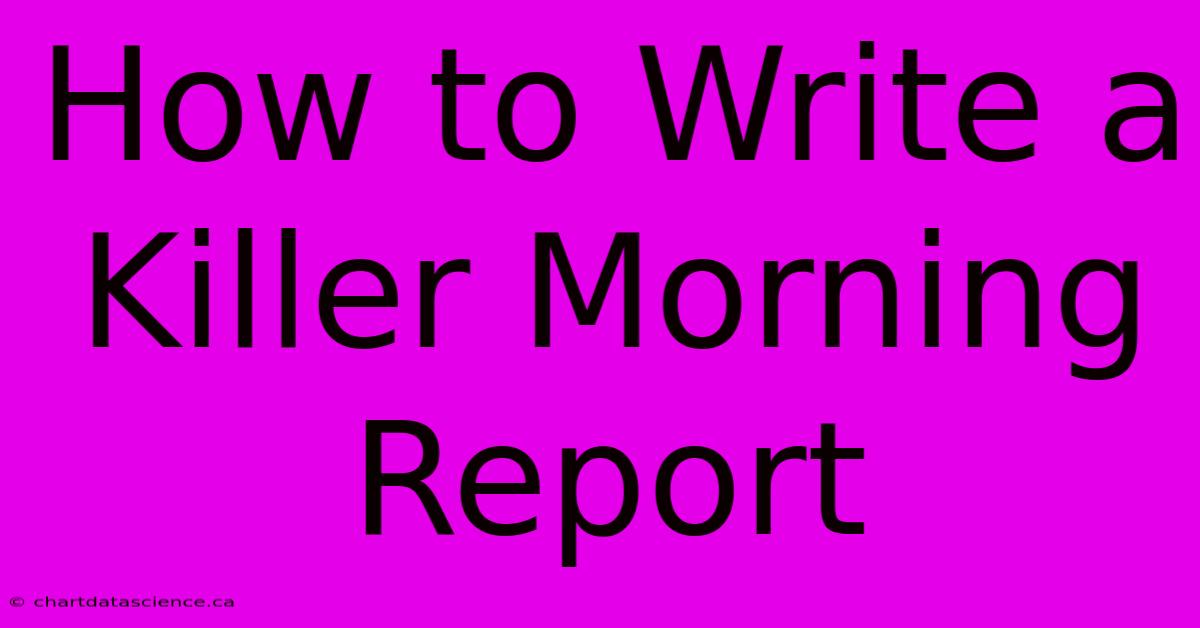How To Write A Killer Morning Report

Discover more detailed and exciting information on our website. Click the link below to start your adventure: Visit My Website. Don't miss out!
Table of Contents
How to Write a Killer Morning Report: Your Secret Weapon to a Smooth Shift
Let's face it, writing a morning report can feel like a chore. But, it's crucial for a smooth shift handover and, let's be honest, it can save your butt if things go south. A solid report isn't just about ticking boxes; it's about painting a clear picture for your colleagues, making their job easier, and avoiding any nasty surprises.
Start with the Basics, But Make 'Em Count
Think of your morning report as a quick rundown of what's going on. Key details are your best friend here:
- Patient Details: Name, age, gender, reason for admission.
- Medications: Current medications, recent changes, any allergies.
- Vitals: Latest readings for temperature, pulse, respiration, and blood pressure.
- Assessments: Any recent observations, changes in condition, pain levels.
- Interventions: Any recent procedures, treatments, or medications administered.
- Upcoming Plans: Scheduled appointments, tests, or procedures.
Pro-Tip: Avoid using jargon or acronyms your colleagues might not understand. Keep it simple, clear, and concise.
The Power of a Good Story: Go Beyond the Facts
Don't just list a bunch of facts. Tell a story about the patient's progress. Think about:
- The Patient's Story: How are they feeling? What are their concerns? What are their goals?
- Key Changes: Highlight any significant changes from the previous shift.
- Things To Watch Out For: Alert your colleagues to any potential issues or areas of concern.
Example: Instead of just writing "Patient is alert and oriented x4," try "Patient is alert and oriented x4, and reports feeling more comfortable since starting pain medication."
Make it a Snap to Read: Formatting is King
Formatting can make all the difference in getting your message across. Here are some key tips:
- Headings: Use clear headings to organize your report and make it easy to scan.
- Bullet Points: Use bullet points to list medications, vital signs, and interventions for clarity.
- Abbreviations: Stick to commonly used abbreviations to avoid confusion.
- Clarity is Key: Use short, concise sentences and clear, simple language.
The Final Touch: A Quick Review
Before submitting your report, take a few minutes to review it. Ask yourself:
- Is it complete? Have you included all the necessary information?
- Is it clear? Would someone reading it understand the patient's current situation?
- Is it accurate? Have you double-checked all the information for correctness?
Pro-Tip: If you're unsure about anything, don't be afraid to ask for help!
A Killer Morning Report is a Teamwork Tool
Remember, your morning report is a vital communication tool. By putting in the effort to write a clear, concise, and informative report, you're setting the stage for a smooth shift handover and a better patient experience. So, take the time to write a killer report and make your colleagues say "Thank you!".

Thank you for visiting our website wich cover about How To Write A Killer Morning Report. We hope the information provided has been useful to you. Feel free to contact us if you have any questions or need further assistance. See you next time and dont miss to bookmark.
Also read the following articles
| Article Title | Date |
|---|---|
| Preview Real Madrid Vs Ac Milan Lineups | Nov 06, 2024 |
| Dow Inc Stock Gains Amid Market Losses | Nov 06, 2024 |
| Trump Vance Fake Election Officials Exposed | Nov 06, 2024 |
| Us Law No Room For Fascism | Nov 06, 2024 |
| Bitcoin Not A Dollar Threat Trump | Nov 06, 2024 |
